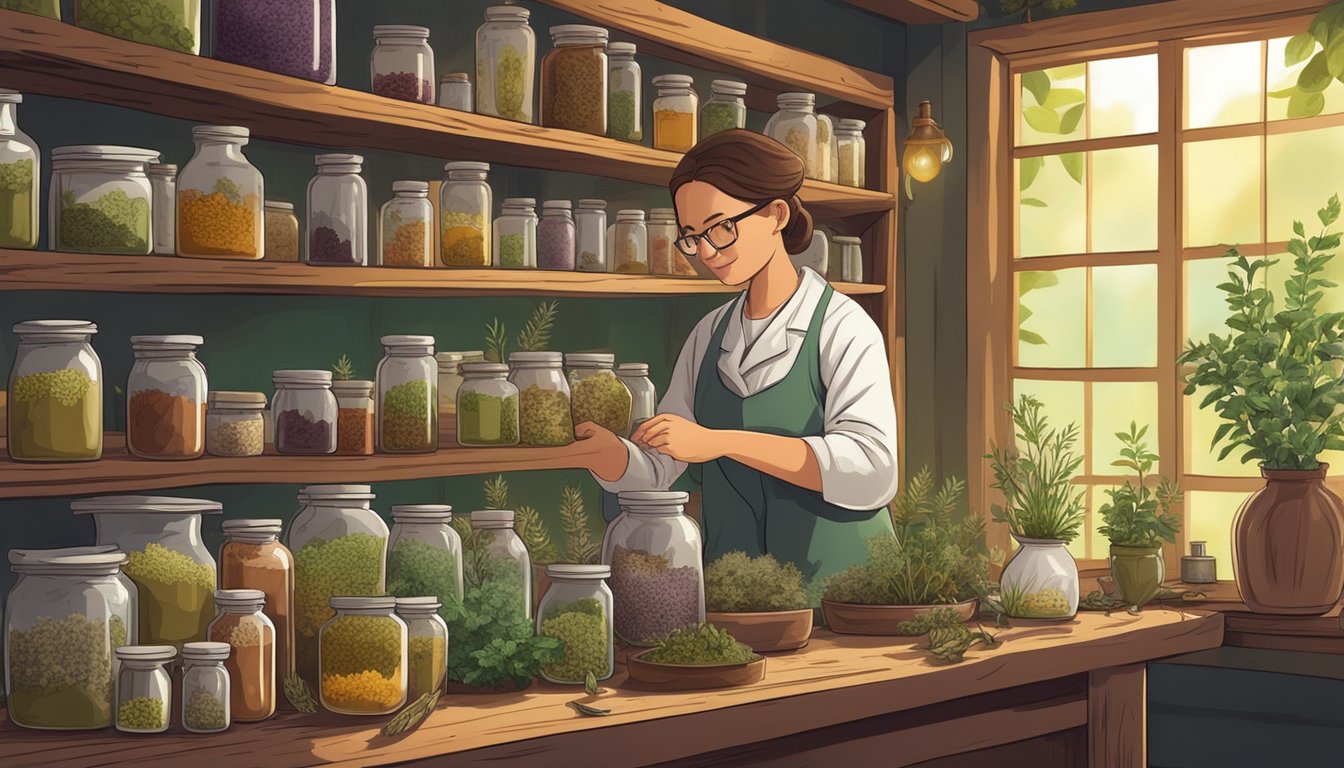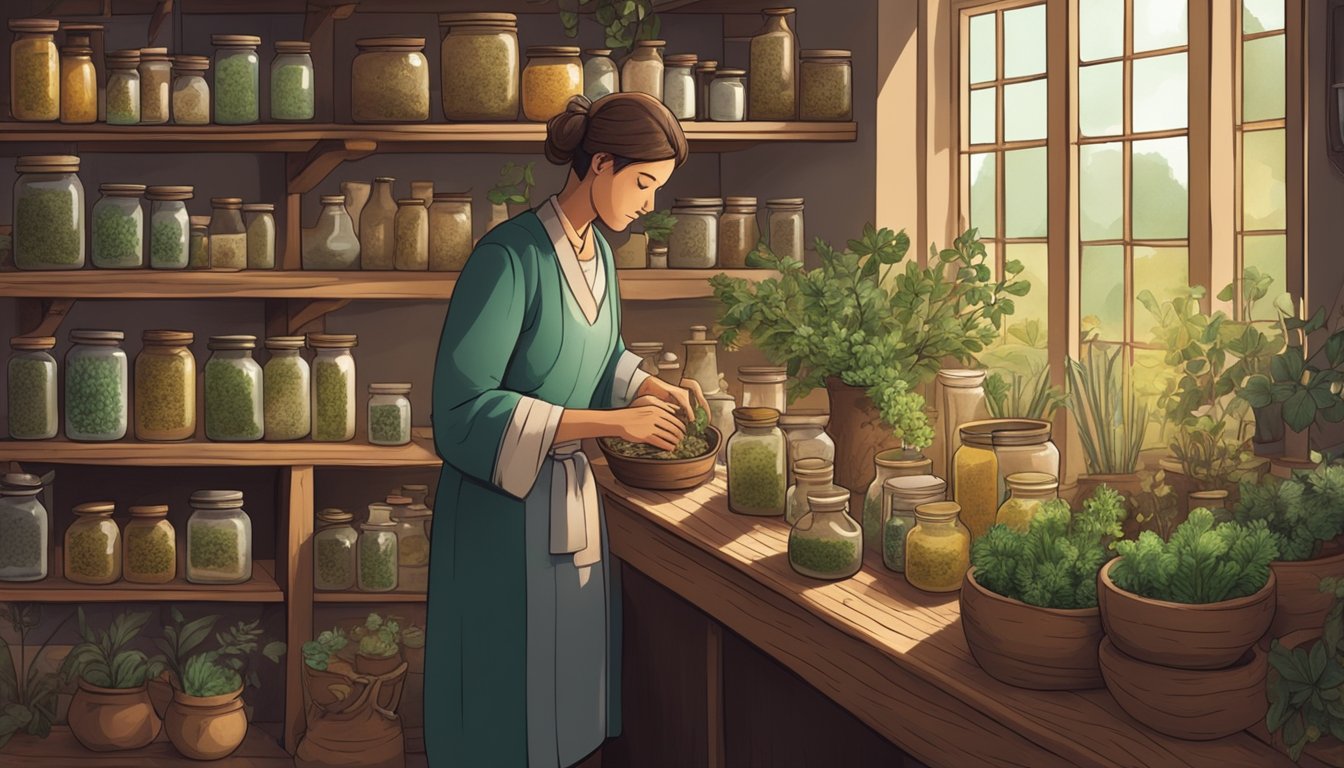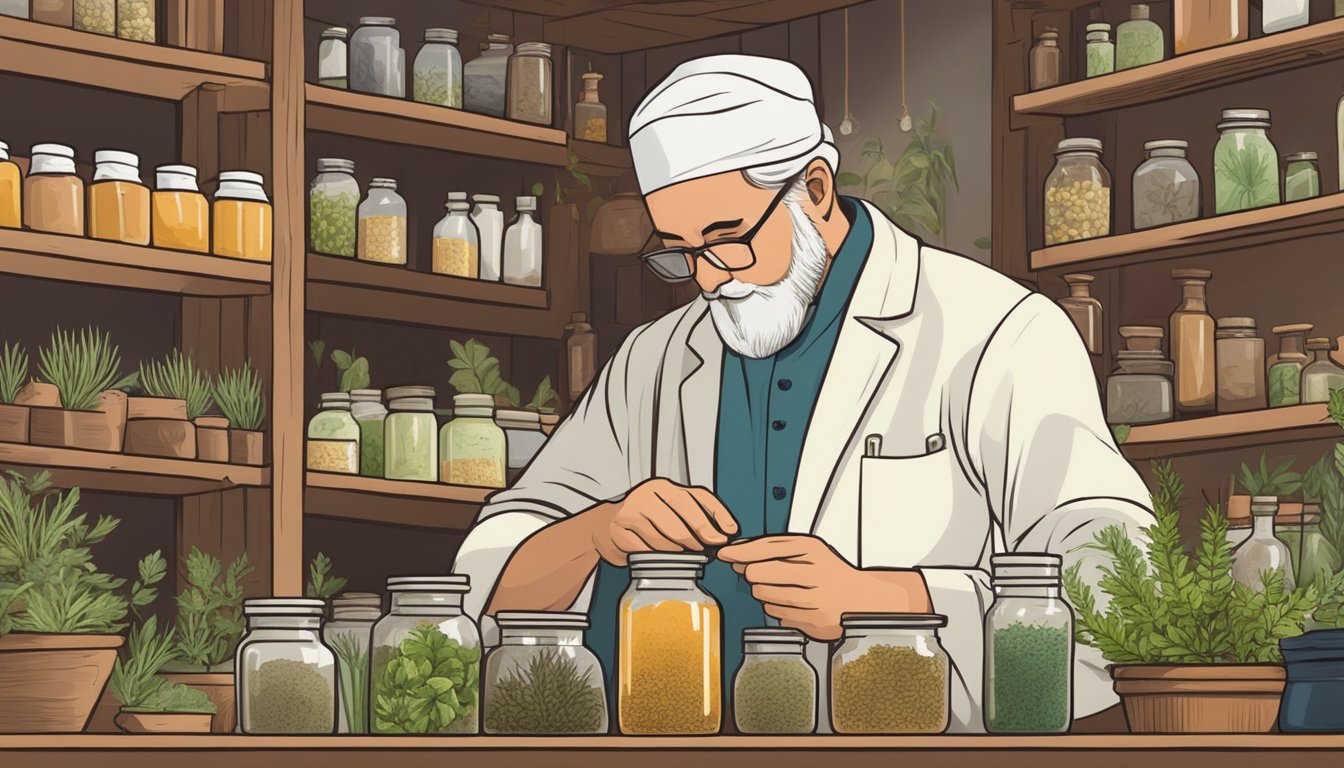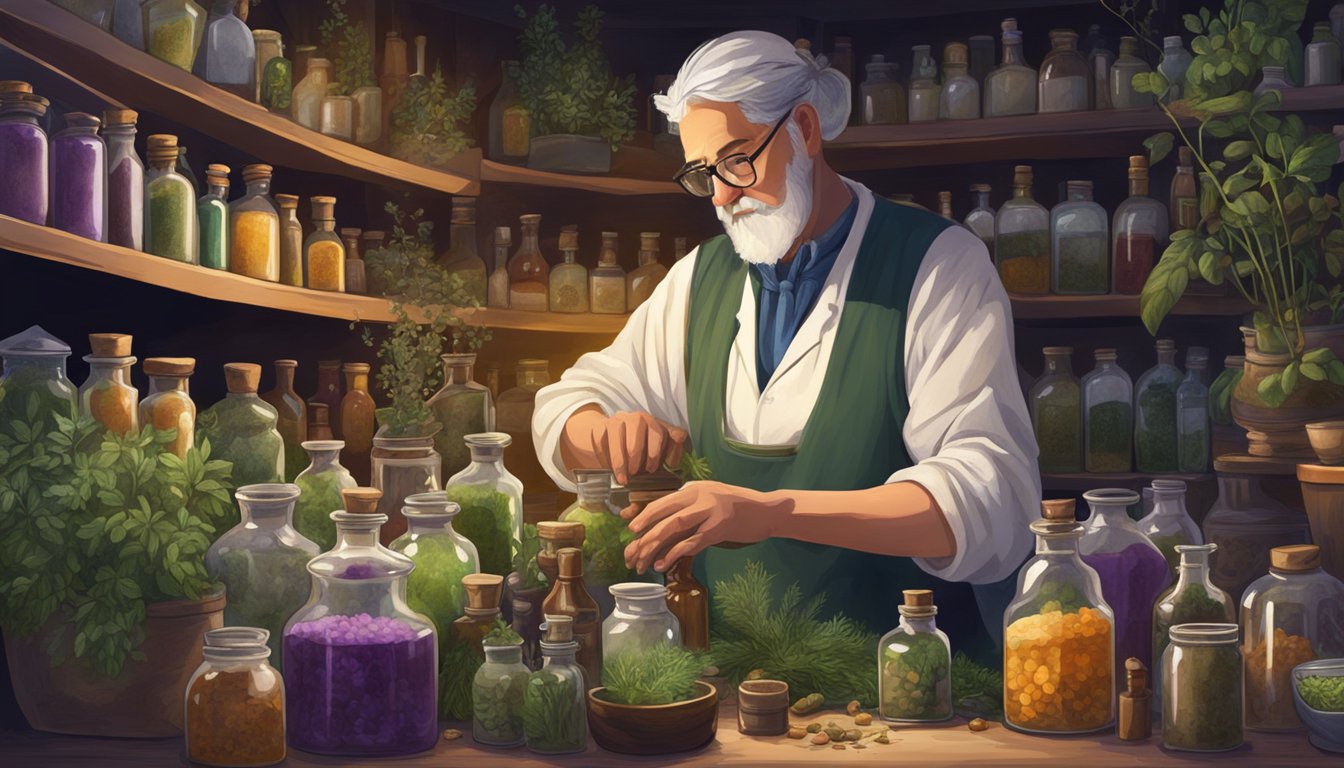TheHerbProf.com is a treasure trove of knowledge for those interested in natural healing and herbal remedies. The website is run by Paul Johnston MD. A naturopathic who has not only received extensive education in the field but also has personal experience in self-healing.
Herbalist doctor is becoming increasingly popular as people seek natural and holistic alternatives to traditional medicine. Herbalism is the study and use of plants for medicinal purposes, and herbalist doctors are trained professionals who use this knowledge to treat patients.
Herbalist doctors take a holistic approach to healthcare, considering the whole person and not just the symptoms of a particular illness. They believe that the body has an innate ability to heal itself, and their goal is to support and enhance this natural healing process. They use a combination of herbs, diet, and lifestyle changes to help their patients achieve optimal health and wellness.
Many people turn to herbalist doctors because they are dissatisfied with the side effects and risks associated with traditional medicine. Herbal remedies are often gentler and safer than prescription drugs, and they can be just as effective in treating a wide range of conditions. If you are interested in exploring natural and holistic healthcare options, a consultation with an herbalist doctor could be a great place to start.
What Is a Herbalist Doctor?
Definition and Role
As a herbalist doctor, I am a trained professional who uses plants and natural remedies to promote healing and wellness in my patients. My role is to work with my patients to identify the root cause of their health concerns and develop a personalized treatment plan that may include herbal remedies, dietary changes, and lifestyle modifications.
Herbalist doctors are not medical doctors and do not replace the role of a primary care physician. Instead, we work in conjunction with other healthcare professionals to provide complementary care that may enhance the effectiveness of conventional treatments.
Training and Qualifications
To become a herbalist doctor, I completed a rigorous educational program that included training in botany, anatomy, biochemistry, pharmacy, and materia medica. I also gained clinical experience through internships and apprenticeships, which allowed me to develop my skills in clinical herbalism.
There are several programs available for herbal education, including those offered by the American Herbalists Guild and other organizations. These programs typically require a minimum of two years of botanical medicine study and two years of clinical experience, as well as a deep knowledge of at least 150 plants, including how to use them and their contraindications.
Upon completion of these programs, herbalists may become registered herbalists or obtain certification through organizations such as the American Herbalists Guild. These credentials demonstrate a commitment to excellence in the field of herbal medicine and provide assurance to patients that they are receiving care from a qualified and knowledgeable practitioner.
In summary, as a herbalist doctor, I work to promote healing and wellness in my patients using natural remedies and plant-based treatments. Through rigorous training and education, I have developed the skills and knowledge necessary to provide safe and effective care to those seeking an alternative to conventional medicine.
Services Provided by Herbalist Doctors

As a herbalist doctor, I offer a range of services to my patients. These services are designed to help individuals achieve optimal health and wellness through the use of natural remedies and lifestyle changes.
Herbal Remedies
One of the primary services provided by herbalist doctors is the use of herbal remedies. Herbal remedies are made from plants and can be taken in a variety of forms such as tinctures, capsules, or teas. These remedies are often used to treat a wide range of health conditions such as colds, flu, and digestive issues. It is important to note that while herbs are generally safe, they can have side effects and may interact with other medications. Therefore, it is important to consult with a herbalist doctor before taking any herbal supplements.
Nutritional Advice
Herbalist doctors also provide nutritional advice to their patients. This advice is designed to help individuals achieve optimal health through the use of a healthy and balanced diet. Herbalist doctors may recommend dietary supplements or organic foods to help individuals meet their nutritional needs.
Lifestyle Recommendations
In addition to herbal remedies and nutritional advice, herbalist doctors may also provide lifestyle recommendations. These recommendations may include suggestions for exercise, stress management, and other holistic wellness practices. By making these lifestyle changes, individuals can improve their overall health and well-being and prevent future health problems.
Herbalist doctors offer a range of services to their patients, including herbal remedies, nutritional advice, and lifestyle recommendations. By working with a herbalist doctor, individuals can achieve optimal health and wellness through natural and holistic means.
Benefits of Seeing a Herbalist Doctor

As a Herbalist Doctor, I believe in the natural and holistic approach to healing. That is why I recommend seeing a Herbalist Doctor for your healthcare needs. There are many benefits to choosing this type of healthcare provider.
Natural and Holistic Approach to Healing – Herbalist Doctor
One of the main benefits of seeing a Herbalist Doctor is that they take a natural and holistic approach to healing. This means that they focus on treating the whole person, not just the symptoms. They use natural remedies such as herbs, supplements, and lifestyle changes to promote healing and wellness. This approach is safe and effective, with little to no side effects.
Personalized Treatment Plans – Herbalist Doctor
Another benefit of seeing a Herbalist Doctor is that they provide personalized treatment plans. They take the time to get to know you and your health history, and then create a treatment plan that is tailored to your specific needs. This personalized approach ensures that you get the best possible care and treatment for your symptoms.
Focus on Overall Wellness and Prevention – Herbalist Doctor
Finally, seeing a Herbalist Doctor can help you focus on overall wellness and prevention. They not only treat your symptoms but also help you make lifestyle changes that promote overall health and wellness. This approach can help prevent future health problems and improve your quality of life.
In summary, seeing a Herbalist Doctor has many benefits, including a natural and holistic approach to healing, personalized treatment plans, and a focus on overall wellness and prevention. If you are looking for a safe and effective healthcare provider, I recommend seeing a Herbalist Doctor.
Common Conditions Treated by Herbalist Doctors

As a herbalist doctor, I have seen many patients with various health conditions. Through my practice, I have found that herbal remedies can be effective for many common health concerns. Here are some of the most common conditions that I treat with herbal medicine:
Digestive Disorders – Herbalist Doctor
Many people suffer from digestive disorders such as bloating, constipation, diarrhea, and acid reflux. Herbal remedies can be effective in treating these conditions. For example, ginger can help relieve nausea and vomiting, while peppermint can soothe an upset stomach. Other herbs such as chamomile and fennel can help with bloating and gas.
Anxiety and Stress – Herbalist Doctor
Anxiety and stress are common issues that can have a negative impact on our overall health and well-being. Herbal remedies can help alleviate these symptoms and promote relaxation. For example, passionflower and valerian root can help calm the nervous system and promote sleep. Other herbs such as ashwagandha and rhodiola can help the body adapt to stress and improve mood.
Chronic Pain – Herbalist Doctor
Chronic pain can be a debilitating condition that affects many people. Herbal remedies can be a natural alternative to prescription pain medication. For example, turmeric and ginger have anti-inflammatory properties that can help relieve pain and swelling. Other herbs such as devil’s claw and white willow bark can help relieve pain and improve mobility.
Skin Conditions – Herbalist Doctor
Many people suffer from skin conditions such as eczema, psoriasis, and acne. Herbal remedies can be effective in treating these conditions. For example, aloe vera can soothe and heal irritated skin, while tea tree oil can help fight acne-causing bacteria. Other herbs such as calendula and chamomile can help reduce inflammation and promote healing.
Overall, herbal remedies can be a safe and effective way to treat many common health conditions. It is important to consult with a qualified herbalist doctor before taking any herbs or supplements, as they can have side effects and interact with prescription medications. In addition to herbal remedies, I also recommend dietary supplements and lifestyle recommendations to support overall health and well-being.
Before You Go – Herbalist Doctor

As a Herbalist Doctor, I am confident in the benefits of using natural and holistic approaches to wellness. However, it is important to note that regulations surrounding the manufacturing, labeling, and testing of herbal supplements are not as stringent as those for pharmaceutical drugs. This means that it is crucial for consumers to do their own research and ensure that the products they are using are safe and effective.
As part of my education and training, I have learned the importance of using high-quality herbs and ensuring that they are properly prepared and dosed. I also understand the importance of working with my patients to develop a personalized treatment plan that takes into account their individual needs and health history.
While the FDA does not regulate herbal supplements in the same way that pharmaceutical drugs are regulated, the FTC does have regulations in place to prevent false or misleading advertising claims. As a Herbalist Doctor, it is my responsibility to ensure that any claims I make about the effectiveness of herbal remedies are backed up by scientific evidence.
Overall, I believe that herbal medicine can be a valuable tool in promoting health and wellness, but it is important to approach it with a critical eye and to ensure that the products and information you are using are reliable and trustworthy.
Herbalist Doctor
Hello, herb enthusiasts! Today, we’re going to explore the role of a Herbalist Doctor. It’s like being a detective, but with herbs!
Now, how does this topic and theherbprof.com connect? Well, let me tell you. The website is a treasure trove of information about herbs and their medicinal properties. So, if you’re looking to learn about the role of a Herbalist Doctor, theherbprof.com is your go-to place.
References – Herbalist Doctor
Little Herb Encyclopedia, by Jack Ritchason; N.D., Woodland Publishing Incorporated, 1995
The Ultimate Healing System, Course Manual, Copyright 1985, Don Lepore
Planetary Herbology, Michael Tierra, C.A., N.D., Lotus Press, 1988
Handbook of Medicinal Herbs, by James A. Duke, Pub. CRP Second Edition 2007
The Complete Medicinal Herbal, by Penelope Ody, Published by Dorling Kindersley
Check the Following Articles!
Home Remedies Viagra: Natural Fix for Erectile Dysfunction
Distillation of Herbs: The Amazing Guide
Herbalist Gin: A Guide to the Botanical-Infused Spirit
Frequently Asked Questions – Herbalist Doctor

As a herbalist doctor, I often receive questions from patients and those interested in pursuing a career in herbalism. Here are some of the most frequently asked questions:
What educational path is required to become a certified herbalist?
In the United States, there is no standardized educational path for becoming a certified herbalist. However, there are many reputable schools and programs that offer training in herbalism, ranging from online courses to in-person apprenticeships. It is important to research and choose a program that aligns with your goals and values.
What is the average salary for a herbalist doctor in the United States?
The salary of a herbalist doctor in the United States can vary greatly depending on factors such as location, experience, and type of practice. According to Indeed, the average salary for a herbalist in the United States is around $49,000 per year.
Which ailments and conditions can a herbalist legally treat?
In the United States, herbalists are not licensed healthcare practitioners and therefore cannot legally diagnose or treat medical conditions. However, they can provide guidance on the use of herbs and other natural remedies to support overall health and wellness.
How does the role of a naturopathic doctor differ from that of an herbalist?
While both naturopathic doctors and herbalists use natural remedies to support health and wellness, the educational paths and scope of practice differ. Naturopathic doctors are licensed healthcare practitioners who have completed a four-year doctoral program in naturopathic medicine. Herbalists, on the other hand, may have a variety of educational backgrounds and are not licensed healthcare practitioners.
What are some highly recommended books for those starting to learn about herbal medicine?
There are many excellent books on herbal medicine, ranging from introductory guides to more advanced texts. Some highly recommended titles include “The Herbal Medicine-Maker’s Handbook” by James Green, “The Earthwise Herbal” by Matthew Wood, and “Rosemary Gladstar’s Medicinal Herbs: A Beginner’s Guide” by Rosemary Gladstar.
Are there any globally recognized institutions for pursuing herbalist studies?
There are several globally recognized institutions that offer training in herbalism, including the American Herbalists Guild and the International Herb Association. It is important to research and choose an institution that aligns with your goals and values.


